

The Web Is Dead? A Debate. O’Reilly to Anderson: It’s the back end that matters.
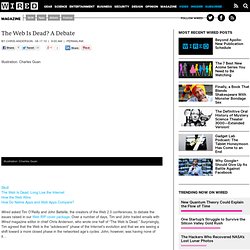
While there’s no question that both Facebook and the mobile app ecosystem provide clear challenges to “the web,” the idea that the browser front end was ever the key to the web’s dominance is so, well, 1995, from the days when Netscape thought that the “webtop” would displace the desktop. But the competitive action has always been on the internet as transport, with data-driven services as the back end. Back when I put on my first conference, the Perl Conference, in 1997, I was already talking about how the internet was becoming a vast repository of programmable services, that screen scraping and overloaded URLs were pointing towards a future internet operating system. And when I put on my “Building the Internet Operating System” conference in 2002, I was already focusing on how Peer-to-Peer distribution, distributed computation, and web services were pointing forward to something much bigger than we’d seen before.
Wired Declares The Web Is Dead—Don’t Pull Out The Coffin Just Yet. The Web is dead, or at least in decline, declares Wired editor Chris Anderson in the magazine’s September cover story.
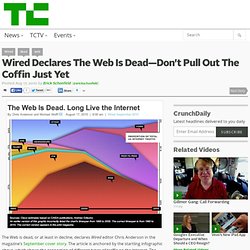
The article is anchored by the startling infographic above, which shows the proportion of different types of traffic on the Internet. The Web, HTML traffic visible though a browser, is only about a quarter (23%) of the overall traffic, down from about half a decade ago. It’s been pushed down by peer-to-peer (23%), video (51%), and other types of apps which use the Internet for transport but are not browser-based. When Wrong, Call Yourself Prescient Instead. In 1997 Wired Magazine declared the browser dead.

“Sure, we’ll always have Web pages. We still have postcards and telegrams, don’t we?” Said Kevin Kelly and Gary Wolf. They were wrong, of course. Is the web really dead? Wired uses this graph to illustrate Chris Anderson and Michael Wolff's claim that the world wide web is "dead.
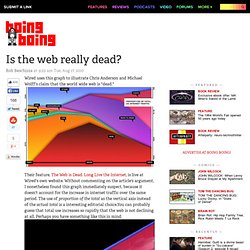
" Their feature, The Web is Dead. Long Live the Internet, is live at Wired's own website. Without commenting on the article's argument, I nonetheless found this graph immediately suspect, because it doesn't account for the increase in internet traffic over the same period. The use of proportion of the total as the vertical axis instead of the actual total is a interesting editorial choice.You can probably guess that total use increases so rapidly that the web is not declining at all.
Perhaps you have something like this in mind: In fact, between 1995 and 2006, the total amount of web traffic went from about 10 terabytes a month to 1,000,000 terabytes (or 1 exabyte). Did the App Kill the Web? - Idea of the Day Blog. Is The Web Dead? My friend Howard Lindzon DM'd me on Twitter last night.
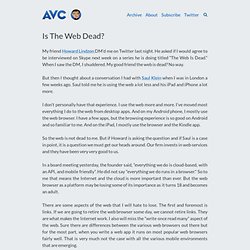
Wired Says 'The Web is Dead' — On Its Increasingly Profitable Website. @psybab: I really liked Boing Boing's chart, which everyone should click through and read, but didn't think they came close to "destroying" Anderson's contention.
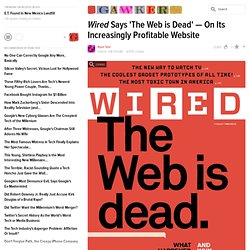
Boing Boing showed the web is growing even if its slice of the overall internet pie is getting smaller. Anderson, meanwhile, used a percentage-of-total chart to show the web is getting a smaller and smaller share of the total internet. which I'm not sure I agree with, because Anderson's fast-growing "video" category could just be a ton of *web* video, but I thought it was a valid approach. There's nothing nefarious about looking at percentages instead of grand totals. That said, the BB grand total version should have been in Wired too as a caveat. @psybab: My lowly unstarred status assured this when unnoticed when I posted it ... but I also think Boing Boing had a point in asking (not in the chart) "How hard is bandwith working? " Maybe an out-there request, but I wish there were a measure of bandwidth efficiency. The Web Isn’t Dead; It’s Just Continuing to Evolve. Chris Anderson, editor-in-chief of Wired magazine and the author of such books as “Free” and “The Long Tail,” has written a piece for the magazine with the provocative — make that inflammatory — headline: “The Web Is Dead: Long Live the Internet.”
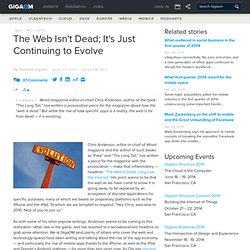
His point seems to be that the web as we have come to know it is going away, to be replaced by an ecosystem of discrete applications for specific purposes, many of which are based on proprietary platforms such as the iPhone and the iPad. To which we are tempted to respond: “Hey Chris, welcome to 2010. Nice of you to join us.” As with some of his other popular writings, Anderson seems to be coming to this realization rather late in the game, and has resorted to a sensationalized headline to grab some attention. Om’s favorite comparison is to the real world of home appliances: we don’t just have a single all-purpose appliance — instead, we have toasters and coffee-makers and can-openers and other devices that perform specific tasks. Another Take on the Web is Dead: Limits to Decentralization - Continuations. Another Take on the Web is Dead: Limits to Decentralization The Wired cover story on “The Web is Dead?
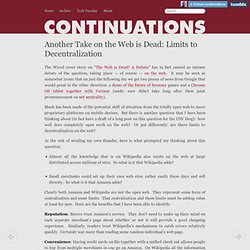
A Debate" has in fact caused an intense debate of the question, taking place — of course — on the web. It may be seen as somewhat ironic that on just the following day we get two pieces of news from Google that would point in the other direction: a demo of the future of browser games and a Chrome OS tablet together with Verizon (aside: sure didn’t take long after their joint pronouncement on net neutrality).